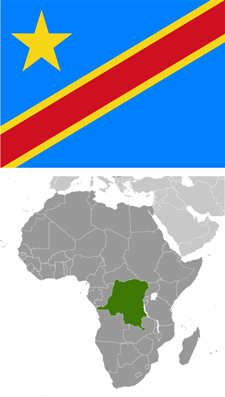
(FinalCall.com) – President Obama’s upcoming trip to Tanzania may have more to do with Rwanda than meets the eye. During the recent 21st African Union/Organization of African Unity summit in Addis Ababa, Ethiopia, Tanzanian President Jakaya Mrisho remarked that Rwanda should “negotiate” with the FDLR (Forces for the Liberation of Rwanda), a rebel movement operating in the mineral-rich, volatile, conflict-torn Democratic Republic of Congo.
Rwandan President Paul Kagame, according to the CNN, has been the darling of the West “ever since he led his country out of the terrible 1994 genocide that left up to one million people dead.”
But this darling of the West status seems in jeopardy, especially since the United Nations accused landlocked Rwanda of helping create and militarily support the “M23” rebel group that wants to overthrow the democratically elected government of Congolese President Joseph Kabila.
In January CNN reported the White House said Obama called Kagame to emphasize “the importance of permanently ending all support to armed groups in the DRC.” Kagame denies backing the M23 rebels.

According to published reports, despite Kagame’s denial, some of his major donors are already withholding financing for projects. This is probably why the country’s finance minister has lowered projected economic growth for 2013.
During a January interview with CNN’s Christiane Amanpour, Kagame said, I think we already have a problem,” acknowledging the situation in DRC is costing his country, whether or not the accusations are true.
Kidwete’s statement didn’t sit well with many Rwandans. Rwanda’s Foreign Affairs Minister Louise Mushikiwabo asked that Tanzania “retract” its statement.
In addition, in an open letter to President Obama, dated May 27, the U.S.-based community of survivors of the 1994 Genocide against the Tutsi wrote it was “appalled by President Kikwete’s remarks which came at a time when Rwandans are still commemorating the 19th anniversary of the Genocide.” Concerning Obama’s upcoming trip to Tanzania the group recommended, “you cancel your trip to Tanzania unless President Kikwete openly apologizes and disavows any relationship he might have with the FDLR.”
Press reports say Obama’s upcoming trip to Africa, which includes stops scheduled for Senegal, South Africa and Tanzania, is to highlight successful democracies the U.S. feels are examples for sub-Saharan Africa. Obama may also be using his trip to Tanzania, which borders Rwanda, to embolden Kikwete and to pressure Kagame to end any military involvement in DRC.
The importance of the DRC to America maintaining its super power status, as Nation of Islam Minister Louis Farrakhan recently said, can’t be minimized. It’s Africa’s second largest country and represents some of the richest mineral deposits in the world.
According to Al Jazeera: “Its uranium was used in the atomic bombs dropped on Japan in 1945; today, its massive coltan reserves are used to make everyday electronic devices like cell phones. Yet for the people who live in the DRC, the minerals have often been less a gift than a curse. Violent armed groups exploit resource-rich areas to support themselves, often raping and killing villagers nearby.”
Al Jazeera only scratched the surface.
Dollars and Sense July/August 2001 edition titled “The Business of War in the DRC: Who benefits” identifies U.S. corporations and the U.S government, historically, as the principle benefactors of the mineral-rich areas of the Congo.
“Dating back to the mid-1960s,” authors Dena Montague and Frieda Berrigan wrote, “the U.S. government literally installed the dictatorship of Mobutu Sese Seko, which gave U.S. corporations access to the Congo’s minerals for more than 30 years. However, over the years Mobutu began to limit access by Western corporations, and to control the distribution of resources. In 1998, U.S. military-trained leaders of Rwanda and Uganda invaded the mineral-rich areas of the Congo. The invaders installed illegal colonial-style governments which continue to receive millions of dollars in arms and military training from the United States.”
Vava Tampa, a native of Congo and founder of Save the Congo, a London-based campaign to tackle “the impunity, insecurity, institutional failure and international trade of minerals funding the wars in DRC” believes Western media outlets do a disservice not giving the atrocities occurring in the DRC coverage similar to fighting in Syria.
In Tampa’s CNN published commentary, he writes of the atrocities occurring in the DRC and the corporate-run media’s failure to report the same, but then failed to mention U.S. companies and U.S. government interest in the DRC.
To give you a look-see at what’s at stake Dollars and Sense reported that the DRC contains “millions of tons of diamonds, copper, colbalt, zinc, manganese, uranium, niobium, and tantalum also known as colton.”
Colton is a valuable resource for American corporations. “Coltan is used to make mobile phones, night vision goggles, fiber optics, and capacitators used to maintain the electrical charge in computer chips. In December of 2000 the shortage of coltan was the main reason that the popular sale of the Sony Play Station 2 video game came to an abrupt halt.”
With the DRC holding 80 percent of the world’s coltan reserves, more than 60 percent of the world’s cobalt, in addition to being the world’s largest supplier of high-grade copper, the atrocities in the DRC may have much to do with maintaining U.S. access to the region’s natural resources.
Multi-national corporations cashing in on the Congo’s natural resources have helped create what many call “Africa’s first world war.” The fact that Obama is taking Kagame to task for Rwanda’s alleged military involvement in the DRC sounds more like protecting American corporate interest than trying to bring stability to the region. The region’s instability may be just the cost of doing business.
Jehron Muhammad, who writes from Philadelphia, can be reached at [email protected].












